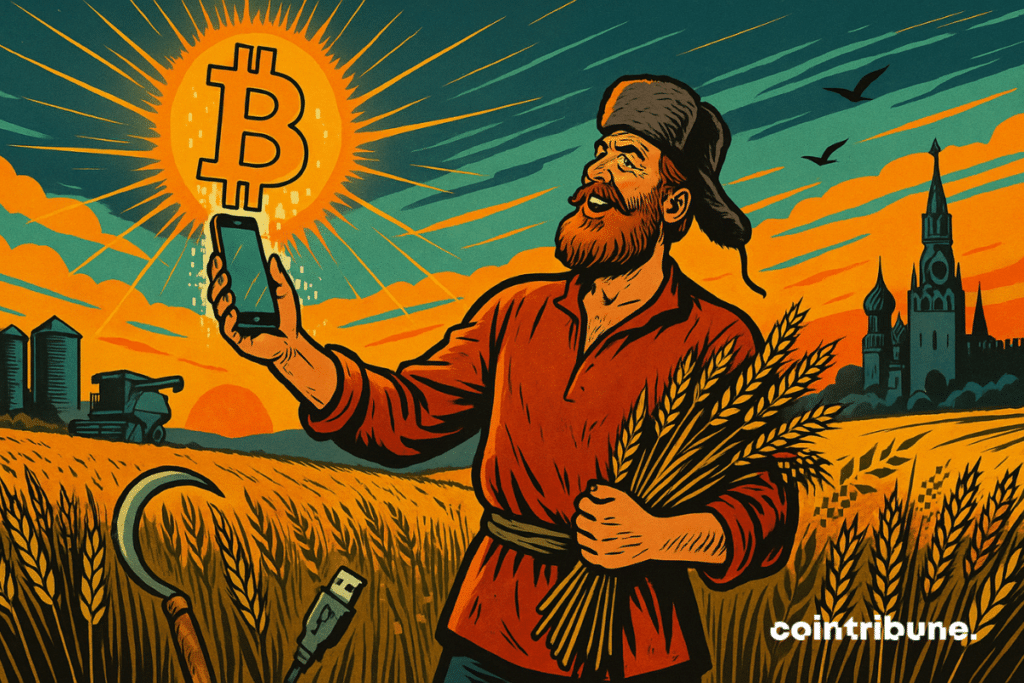Moscow Wants To Bypass SWIFT With Cryptocurrency For Its Agricultural Exports
As the lines of global trade shift under geopolitical pressure, Moscow is considering swapping traditional currencies for cryptos for its agricultural exports. This is not a marginal experiment but a massive project: the payment for 49.5 million tons of grain could be made in crypto. An initiative that, if realized, would redefine trade rules for sanctioned states and impose blockchain as an alternative to dominant financial systems.

In brief
- Russia plans to use cryptos for receiving payment for the export of 49.5 million tons of grain.
- This project aims to bypass the restrictions imposed by the SWIFT system following international sanctions.
- The use of cryptos could extend to other sectors if the experiment in agriculture proves successful.
- Russia potentially paves the way for a new era where cryptos become tools of economic policy.
A crypto payment for an agricultural giant
Russia and China recently took a step by now settling part of their bilateral trade exchanges in bitcoin. This agreement highlights their shared desire to break free from traditional financial circuits.
It is in this same spirit that Oksana Lut, Deputy Minister of Agriculture of Russia, confirmed that Moscow is about to implement the use of cryptos for receiving payment of its agricultural exports.
“We are technically ready to launch transactions via cryptos on our experimental platform. All that remains is to organize the enforcement mechanism“, she announced. The volume involved is considerable: 49.5 million tons of grain are at stake in the current campaign.
Thus, during the Russian grain forum, which gathered 1,000 participants in Sochi on May 30, 2025, Irina Zhachkina, First Deputy General Director of the Russian Agricultural Bank, mentioned this possibility. She stated:
We believe that cryptos can be a practical alternative instrument and, currently, we, in collaboration with the Bank of Russia and all stakeholders, are considering the possibility of using crypto tools for payments in grain trade.
This is not a theoretical test but a potentially large-scale operational deployment.
This initiative is based on several important elements:
- The project management is entrusted to Rosselkhozbank, the Russian Agricultural Bank, a key banking institution in the agri-food sector, hit by international sanctions.
- The transaction will take place on an “experimental digital market,” a platform still in its pilot phase, specially designed to handle cryptocurrency payments.
- The stated objective is to circumvent the blockages related to the SWIFT system, to which Russia has partially lost access since 2022.
- The Central Bank of Russia participates in the regulatory supervision of this mechanism, suggesting integration into a controlled legal framework, unlike the free use of public cryptos like bitcoin or Ethereum.
The choice to start with the agricultural sector is no coincidence. It is a strategic segment of the Russian economy, whose export revenues are essential.
Relying on blockchain to settle its grain exports, Moscow is testing a formula that could eventually apply to other segments of foreign trade.
Towards a new commercial paradigm?
Beyond the operational announcement, Russia’s growing interest in crypto payments in foreign trade reveals a dynamic of redefining global financial flows.
This strategic direction echoes recent discussions on creating alternative payment corridors, notably targeting trade partners in Asia, Africa, the Middle East, and within the BRICS bloc.
In this context, the use of cryptos becomes a response to sanctions, but also a diplomatic tool to broaden Moscow’s economic influence. According to Oksana Lut, “it is crucial to ensure the continuity of agricultural trade, and this involves adapting our payment methods to new geopolitical realities“.
The particularity of this initiative lies in its discretion and precision. It is not a generalized crypto project, but a targeted application, piloted by a strategic sector (agriculture) and backed by a controlled banking structure.
This model could inspire other countries seeking alternatives to financial networks dominated by the West. However, the nature of the cryptos used remains unclear. Russia appears to be proceeding cautiously, avoiding any direct confrontation with international regulators while laying the groundwork for a parallel system.
This experiment could ultimately disrupt the rules of the game in the global commodities market. If it proves functional and accepted by Russia’s trade partners, it would offer a strong precedent to other states in diplomatic tension. In a world where monetary fragmentation accelerates with other currencies nibbling away at the dollar’s hegemony, Russia plays a bold card: making cryptos not just speculative investment tools but instruments of sovereign economic policy.
Maximize your Cointribune experience with our "Read to Earn" program! For every article you read, earn points and access exclusive rewards. Sign up now and start earning benefits.
Diplômé de Sciences Po Toulouse et titulaire d'une certification consultant blockchain délivrée par Alyra, j'ai rejoint l'aventure Cointribune en 2019. Convaincu du potentiel de la blockchain pour transformer de nombreux secteurs de l'économie, j'ai pris l'engagement de sensibiliser et d'informer le grand public sur cet écosystème en constante évolution. Mon objectif est de permettre à chacun de mieux comprendre la blockchain et de saisir les opportunités qu'elle offre. Je m'efforce chaque jour de fournir une analyse objective de l'actualité, de décrypter les tendances du marché, de relayer les dernières innovations technologiques et de mettre en perspective les enjeux économiques et sociétaux de cette révolution en marche.
The views, thoughts, and opinions expressed in this article belong solely to the author, and should not be taken as investment advice. Do your own research before taking any investment decisions.